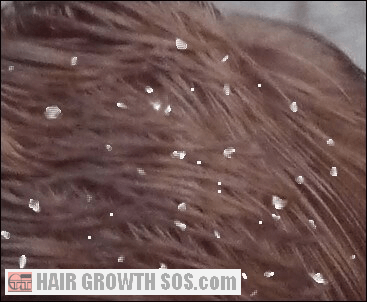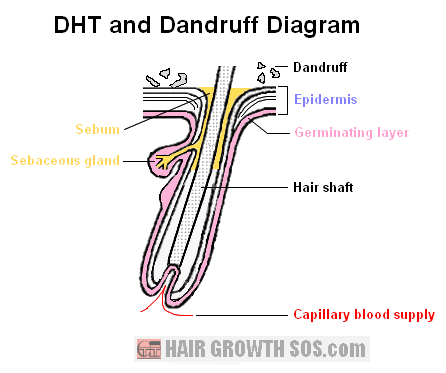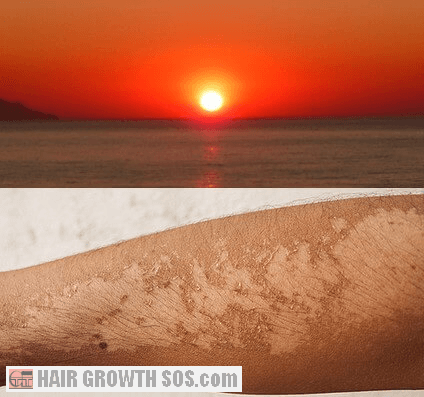Does Dandruff Cause Hair Loss?
By Paul Taylor
No, is the simple answer. But there can be a link between dandruff and hair loss because sometimes the opposite is true - hair loss can cause dandruff. And high DHT levels are largely to blame.
This article answers the following questions:
- How does hair loss cause dandruff?
- Why does dandruff and hair loss only develop in scalp hair and nowhere else?
It also explains how to treat both conditions at the same time using either a drug-based or natural approach.

How Does Hair Loss Cause Dandruff?
The type of hair loss that might cause dandruff is androgenetic alopecia.
This condition progressively reduces the blood supply to hair follicles in the infamous "male pattern baldness" region of the scalp. And, because the high density of hair in the scalp places a high demand for nutrients, this is what causes the hair loss to develop.
The hormone dihydrotestosterone (DHT) contributes to the hair loss process. However, despite this, the body increases* (upregulates) DHT levels to the scalp in an attempt to restore hair growth back to normal.
* The reason why the body does this is because DHT is a steroid hormone, which means it has an anabolic effect which should help hair growth.
However, DHT upregulation does not work.
The previous page revealed two ways (a primary and secondary effect of DHT) how I believe DHT is involved in the hair loss process, and why DHT upregulation is unsuccessful.
Basically though, DHT can't stimulate hair regrowth because of insufficient blood supply to the hair follicles.
DHT initiates dandruff production
When the body increases levels of DHT, this doesn't just affect hair follicles.
Sebaceous glands in the scalp skin and hair follicles are affected too (see dandruff diagram below). This increases production of sebum (oil) which then feeds a fungus (called malassezia furfur). This fungus can then proliferate, causing dandruff or even seborrheic dermatitis.

Very bad dandruff
can develop from hair loss in this way and then persist, becoming a chronic condition alongside the hair loss that caused it.
No dandruff but total baldness instead
If your hair loss continues and extensive baldness develops, any related dandruff problem you have should subside.
That's because, by that stage, the hair follicles are only producing tiny (vellus) hairs, or even no hair at all, which means that there will be less demand for a strong blood supply.
And when hair growth has all but
stopped, the body should recognize this and then reduce (downregulate)
both DHT and sebum production, causing the rate of dandruff formation to
slow down and eventually stop.
Summary: Hair loss and dandruff Link
So that’s how dandruff and hair loss can be connected. Dandruff can't cause hair loss, but the opposite can sometimes be true.
However,
it is worth mentioning that, since dandruff can often be itchy, any
excessive scratching of the scalp might cause some hair to dislodge. And
that could give the impression that dandruff can cause hair loss.
Why Does Dandruff and Hair Loss Only Develop in Scalp Hair?
A number of factors can explain why the combination of dandruff
and hair loss only affects the scalp and no other part of the body:
1. The main reason is the underlying cause of hair loss in the first place - skull expansion. (Obviously, skull expansion only affects the head!)
2. Scalp hair density is much greater than in any other region of the body. So the sheer number of scalp hair follicles (and sebaceous glands they contain) means that more DHT can accumulate there than anywhere else, causing more dandruff to develop.
3. The high hair density of the scalp also means that any dandruff formed will be much more noticeable than anywhere else. Skin does still flake from the rest the body, but since hair density and DHT levels elsewhere are much lower, you really shouldn't notice any skin shedding.
But there is a very obvious exception to this:
If your skin is not adjusted to strong sun (perhaps you're fair skinned?) and you spend too long sunbathing unprotected (i.e., without applying a high SPF suncream) it's quite likely that you’ll experience sunburn and your skin will start to peel after a few days.
Essentially, your skin has been damaged by the sun, so you soon notice it flaking off as it gets
replaced by new skin from below.

Drug Treatment for Dandruff and Hair Loss
Dandruff is usually caused by one of the following culprits:
- Dry skin
- Adverse reaction to hair and skin lotions and
medications
- Skin disorders (e.g., psoriasis, seborrhea)
- Head lice infestation
- Poor diet
- Yeast sensitivity
All these potential causes can be treated using medicated shampoos. But, conventional treatment for dandruff won't be effective against hair loss.
So if you’ve got very bad dandruff and hair loss, and suspect both conditions are connected, instead of using a standard dandruff shampoo (which will probably contain zinc pyrithione or selenium sulfide) it might be a better idea to get some help for your hair loss at the same time using the same product.
That way, if you successfully manage to address your hair loss problem, you might be able to control or even cure your dandruff as well.
Nizoral shampoo is one such product. This is a dedicated medicated dandruff shampoo containing the drug
ketoconazole which can also be used for hair loss (1)(2).
Natural Treatment for Dandruff and Hair Loss
Essential oils can be used to treat many conditions, including
dandruff.*
* Source: Aromatherapy for the Family. Kusmirek J. Wigmore Publications Ltd, UK. 1997 ISBN 0 946982 06 6
So, since they're very easy, safe and natural to use, it might be an idea worth trying.
Simply add a few drops of one or more of the following essential oils to water and then use it to rinse the scalp:
- Lavender
- Rosemary
- Cedarwood
Additionally, the following essential oils can help with very greasy hair:
- Clary Sage
- Lemon
If you suffer thick, heavy dandruff caused by seborrhea, one or both of these essential oils can be added to the rinse as well. Bear in mind though that clary sage has a very powerful smell, whereas lemon is much more pleasant and tolerable.
Note: I've selected these five essential oils because they can also be used to treat hair loss. To learn more about this natural form of hair loss treatment, read: Essential oils for hair loss.
I believe the most effective way to treat hair loss is to treat the underlying cause - skull expansion. And, to do this, many men and women are now using the same method I used myself to restore strong hair regrowth. Learn about my methods?
This is page 3 of 3.
Read previous page? Thinking about finasteride for hair loss? Think again!
Note: Always consult with a doctor to identify and treat which dandruff and hair loss conditions you have.
|
Like this page? |
|

